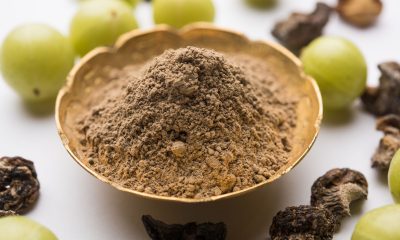Health
6 Benefits of conjugated linoleic acid and side effects

Discover the 6 Benefits of conjugated linoleic acid and side effects.
While many hear “butter and beef” and immediately think of heart attacks and weight gain, the truth is that all types of natural fats are healthy and even beneficial when you eat high-quality versions of them and take them in moderation, In particular, the benefits of conjugated linoleic acid are necessary for our diet.
The body needs all three types of fats (yes, even saturated fats!) For optimal health, as they all have various functions, from pregnancy to digestion to brain function.
Not only is it true that eating fat doesn’t make you fat, but certain types of healthy fats are some of the best fat-burning foods available.
But quality is very important for fats, especially those that come from animal products; These types of acids are known to fight cancer, block weight gain, and help build muscle, and are found almost exclusively in the high-quality meat and lard of healthy grass-fed cows or other animals.
According to multiple investigations, the benefits of conjugated linoleic acid include:
• Muscle enhancements and muscle strengthening
• Anti-cancer effects
• Bone building benefits
• Growth and development support
• Reverse atherosclerosis (hardening of the arteries)
• Improve digestion
• Reduce food allergies and sensitivities
How does conjugated linoleic acid work?
All types of fats (lipids), whether they are products of animal origin, eggs, dairy products, oils, nuts, seeds, or coconuts, are made up of fatty acids.
Some fats are considered essential because the body cannot produce them on its own, while others are not essential because the body can synthesize them from other nutrients.
The essential fats that we need to obtain from our diet include omega-3 polyunsaturated fatty acids (found in fish, shellfish, eggs, and some nuts or seeds) and omega-6 polyunsaturated fats (found mainly in vegetable oils, nuts, and seeds ).
These two types have important, but somewhat opposite, effects on the body; Omega-3s are known to be anti-inflammatory, while omega-6s are inflammatory.
We need both types of essential fats to balance our immune, hormonal, digestive, and nervous system functions, which is why there are so many risks to a low-fat diet when someone stops consuming enough healthy fats.
Ideally, the diet would be the same in terms of omega-3 and omega-6 fatty acid intake, but the standard American diet is much higher in omega-6, which is why it is known to be so “inflammatory.” Sadly, inflammation is at the root of most chronic diseases, which include cancer, heart disease, diabetes, depression, autoimmune disorders, and dementia.
Among the different types of fatty acids, there are saturated, monounsaturated, and polyunsaturated fats, which are three names used to describe the chemical structures of fats.
Each type provides different benefits and functions thanks to its particular effects on the various systems of our bodies. All fatty acids are chains of carbon atoms attached to a hydrogen bond.
When each carbon acid binds to hydrogen, saturated fat is formed; If a pair of carbon atoms form a bond, monounsaturated fat is formed; and when there are more than two unsaturated bonds, polyunsaturated fat is formed.
We usually describe a food source as a type of fat (such as olive oil being monounsaturated or beef being saturated), but the truth is that almost all foods are made up of various types of fat.
The main omega-6 fat is called linoleic acid, and it is found in foods that include grains and vegetable oils (such as corn, safflower, sunflower, or canola oil).
Currently, it is known that Omega-6 oils are excessively consumed and, therefore, dangerous, mainly by people who consume a large number of processed foods and are made with low-quality oils.
Benefits of conjugated linoleic acid
1.- Helps with weight loss and fat burning
You may find it hard to believe, but it turns out that butter is a fat-burning food, CLA has been shown to help with fat loss in many animals and some human studies, which is why in its concentrated form it is one of the most popular weight loss supplements in the world.
In human studies, the results of CLA on weight loss have been somewhat mixed, although still promising.
One study found that supplementation of a CLA blend in overweight and obese people decreased body fat mass and increased lean body mass.
Other studies have shown similar results and that CLA also has no adverse effects on overall blood lipids, inflammation levels, and insulin response in healthy, overweight, and obese adults.
Some people are believed to experience better results than others due to factors including a combination of CLA isomers versus individual isomers, CLA dose and duration of treatment, sex, weight, age, and metabolic status of the subjects.
One of the possible mechanisms by which CLA reduces body fat mass could be that it decreases energy consumption or increases energy expenditure.
One study showed that mice supplemented with a CLA blend for four weeks reduced their food intake and experienced improvements in liver function, although studies have not shown this same effect yet in humans.
2.- Regulates blood sugar and helps improve insulin function
There is strong evidence that there is an inverse association between taking the benefits of conjugated linoleic acid in someone’s diet and the risk of diabetes.
The hypothesis is that CLA may be involved in the regulation of insulin; We also know that the best food sources of CLA, including healthy fats like butter or grass-fed beef, can stabilize blood sugar and help someone follow a low-sugar, low-carb diet that is beneficial for controlling diabetes.
3.- Improves immune function and could help fight cancer
Conjugated linoleic acid has shown immune-enhancing effects and anticancer activities in several animal studies.
The CLA in foods with saturated fat may offset the adverse effects of saturated fat content and benefit everything from blood sugar control to hormonal regulation to natural cancer prevention.
Research repeatedly shows that the quality of fatty acids in a person’s diet is very important in reducing overall cancer risk, and conjugated linoleic acids (especially rumenic acid) have been shown to promote health in several ways, especially by decreasing inflammation.
Lower inflammation is a sign of less free radical damage (or oxidative stress) that is linked to a lower risk of cancer.
It appears to modulate immune and inflammatory responses, as well as improve bone mass.
Research on the effects of conjugated linoleic acid in preventing breast cancer is somewhat conflicting, but some preliminary research suggests that a higher intake of CLA from natural foods is linked to a lower risk of developing breast cancer.
Other study results suggest that it may be beneficial in fighting cancer of the digestive organs and may also improve detoxification through healthier liver function.
4.- Reduces allergies and asthma symptoms
Consuming foods high in conjugated linoleic acid or taking CLA supplements for 12 weeks appears to improve symptoms and general well-being in people with seasonal allergy symptoms.
Similarly, some research shows that for people with asthma, CLA may be a natural treatment method for asthma-related symptoms; twelve weeks of supplementation appears to improve airway sensitivity and the ability to exercise.
5.- Improves the symptoms of rheumatoid arthritis
Early research suggests the benefits of conjugated linoleic acid are good for reducing inflammation and therefore autoimmune disorders like rheumatoid arthritis.
Taking conjugated linoleic acid alone or in conjunction with other supplements such as vitamin E benefits those with arthritis by reducing symptoms, including morning pain and stiffness.
Markers of pain and inflammation, including inflammation, have been improved for adults with arthritis taking CLA compared to pre-treatment symptoms or people not taking CLA, meaning that CLA can treat arthritis in a natural.
6.- It could improve muscle strength
Although the findings have also been somewhat conflicting, some research shows that taking conjugated linoleic acid alone or in conjunction with supplements such as creatine and whey protein can help increase strength and improve lean tissue mass.
This is why CLA is often added to some bodybuilding supplements, protein powders, or weight loss formulas.
The Best Sources of Conjugated Linoleic Acid
The main food sources rich in conjugated linoleic acids include the following:
• Grass-fed butter (ideally organic)
• Whole dairy products, preferably raw, such as cream, milk, yogurt, or cheese
• Grass-fed beef (ideally organic)
• It is also found in dairy products from sheep or goats, in addition to cows
• Found in smaller amounts in grass-fed lamb, beef, turkey, and shellfish
Side Effects of Conjugated Linoleic Acid
• CLA is considered safe when eaten as part of whole natural foods or taken by mouth in medicinal amounts greater than those found in food.
For some people, taking CLA supplements may cause side effects such as an upset stomach, diarrhea, nausea, and fatigue.
• Regarding conjugated linoleic acid for children, it is best to avoid supplementing your children as there is not enough evidence at this time to know if long-term use is safe.
However, food sources like butter and meat are safe and encouraged, as they provide not only CLA, but also important nutrients for growth and development, including various vitamins, minerals, and proteins.
• If you are going to have surgery or have a history of poor liver function or bleeding disorders, be aware that supplementation with CLA may not be safe.
Conjugated linoleic acid can slow blood clotting and increase the risk of bruising and bleeding, but re-eating foods with CLA should not pose a risk.
Can you get linoleic acids through supplements?
• It’s also possible to get CLA from supplements, but as with most nutrients, CLA in supplement form won’t necessarily have the same health effects as CLA from real, natural foods.
The types of CLA found in supplements may also not be the most effective types; whole foods are made from c9, t11 CLA, while many supplements are high in t10, c12 CLA.
• While CLA supplementation has shown positive effects in controlling the risk and symptoms of some diseases, most may lack high levels of rumen acid, which is the predominant form of CLA found in natural foods
Health
Dangers and side effects of spirulina

Table of Contents
Health
5 health benefits of bananas for men

Table of Contents
Discover the 5 amazing health benefits of bananas for men.
Bananas have various male health benefits. They can be used effectively to fight against constipation, help protect the kidneys and more.
Bananas are rich in nutrients, including vitamins (A, C, and B6), minerals (potassium, magnesium, folate, riboflavin, niacin, thiamin, and iron), protein, carbohydrates, fat, and fiber.
<img class=”i-amphtml-intrinsic-sizer” style=”box-sizing: border-box; max-width: 100%; display: block !important;” role=”presentation” src=”data:;base64,” alt=”” aria-hidden=”true” /><img class=”i-amphtml-intrinsic-sizer” style=”box-sizing: border-box; max-width: 100%; display: block !important;” role=”presentation” src=”data:;base64,” alt=”” aria-hidden=”true” />
Due to their high nutritional content, bananas exhibit several benefits when consumed, especially for men.
1. Heart and nervous system
The high potassium content in bananas helps protect the heart and nervous system.
It also helps in muscle contraction.
Therefore, bananas are good for the heart, digestive system, and other muscles in the body.
That is why it is recommended to eat a banana before or after exercise.
Potassium also helps keep the heart rate at a normal rate.
Potassium and low sodium help keep blood pressure low.
2. Bananas for kidney and bones
The high potassium content of bananas also contributes to healthy kidney function and bone development.
This is because potassium retains the loss of calcium in the urine, which allows the body to absorb more minerals and thus strengthen the bones.
3. Bananas for blood and immune system
The high content of vitamin B6 supplies blood haemoglobin and maintains healthy blood sugar levels for the body by converting carbohydrates into glucose.
Vitamin B6 also helps the body make antibodies, which are used by the immune system to fight disease.
4. Bananas to improve mood
Bananas contain an amino acid called tryptophan, which is converted into serotonin in the body.
It maintains a positive mood and helps fight depression.
During stress, the body consumes potassium.
Because a banana contains around 400 milligrams of potassium, eating one a day can help you stay healthy during times of stress.
5. Bananas for weight management
The fibers present in bananas can help maintain regular bowel movements.
They can also help you feel fuller longer after eating.
We hope the article “5 health benefits of bananas for men” was of help to you.
Health
8 Benefits of mustard oil and side effects

Table of Contents
-

 Benefits5 months ago
Benefits5 months agoThe Benefits of Joining Gym Lumolog – Improve Your Fitness & Health
-

 Food1 year ago
Food1 year ago10 + Benefits of carrot juice and side effects
-

 Health1 year ago
Health1 year ago50 Super Healthy (And Very Often Cheap) Foods
-

 Health1 year ago
Health1 year ago5 Shocking health benefits of kinkeliba and side effects
-

 Health1 year ago
Health1 year ago15 health benefits of soursop leaves tea and side effects
-

 Food1 year ago
Food1 year ago8 shocking benefits of leek juice and side effects
-

 Health1 year ago
Health1 year ago15 Benefits of lipton tea and side effects
-

 Health1 year ago
Health1 year agoBenefits of guava leaves Sensually












